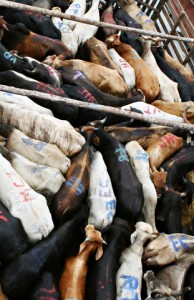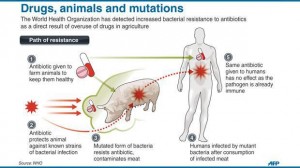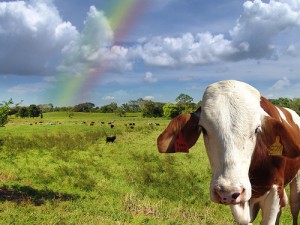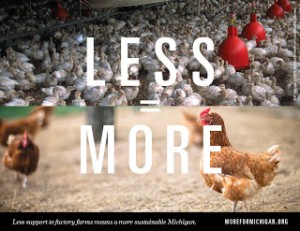Electronic and visual Mode
Truths Behind Factory Farms: How to Live a Healthier and More Ethical Life
(http://farmswithoutharm.blogspot.com/2013/03/take-crap-out-of-farm-subsidies.html)
When the majority of people are at the store or out to eat, they are focusing on what type of meat they want, not about where that meat is coming from. Today, the majority of Americans still think that our animals are being raised on farms. Wrong, Factory farming now accounts for more than 99 percent of all farmed animals raised and slaughtered in the United States. That is over 10 billion animals that die each year in America for our food consumption. These factory farms are designed to produce the highest possible output at the lowest possible cost to the operator. With this as their goal, it leaves many unethical and unhealthy issues that come along with it. Consuming food that is produced by factory farming is not only supporting cooperation’s that do not have everyone’s best in thought, but it is also harmful for the animals involved and the consumers of these animals.
Secrets behind factory farming
Factory Farming sounds like a great idea until you look at the details behind how these farms are ran. To start off, factory farmers on average hold more then 125,000 animals at one time. The amount of animals they cram into these farms leave them with very little room to move. According to the journal, The Dangers of Factory Farming,

finishing pens for pigs provide six feet of space, this is just enough room for them to take one step forward or backward. Also, many of these animals are being chained together by their shoulder collar which leads to less movement and freedom. This confined space leads to many problems with lameness, obesity and stress-induced diseases.
These animals are not only confined to small living spaces but they are living on top, and in their own waste. Living this way leads to sever respiratory and heart diseases for the animals. Many factory farmed animals are experiencing symptoms of stress and depression. The majority of these “farms” are inside not allowing these animals to see the daylight or enjoy fresh air. These are just a few explanations about how millions of animals are being treated just for fast production to get out to the consumers to increase profit for the companies.
On top of cramming as many animals into a small place as they can, these animals are also being fed about anything that will allow them so survive and grow quickly for the lowest cost. According to Food and Agriculture’s article “What They Eat” states that factory farm animal feed is packed full of many health hazardous things that would not be in their typical diet. Starting off with the addition of same species meat, diseased animals, and feathers, hair, skin and blood. Also, it is legal for them to add in rendered road kill, dead horses, and euthanized cats and dogs. Many times the addition of manure and other animal waste is commonly found in the fed. The addition of these animal products and byproducts increases the risk of these animals contracting infectious and deadly diseases such as mad cow disease. To try and fix this on going problem, it has been routine to add in low dose antibiotics in to the animal feed. According to the Natural Recourse Defense Counsel’s article Saving Antibiotics, 80 percent of all antibiotics used in the United States are used in food animals. The addition of antibiotics causes there to be a large bacterial resistance to these medications causing the next generations of bacteria to worsen. This makes it difficult for us to continuously develop and discover new antibiotics to control the problem. What They Eat also states that there is an unhealthy amount of grains being fed to these animals. This is especially bad for the animals who’s natural diets do not include grains. According to The Dangers of Factory Farming, cattle that are meant to have grass fed diets, develop health problems such as excessively acidic digestive systems and liver abscesses, these problems also attribute to the increased dosages of antibiotics.
Health hazards for human health
What is being fed to these animals is then being consumed by us. When asked if you would like to consume meat from your own specie, blood, hair, antibiotics etc. the majority of people would reply No. But that is the catch, many people have no idea what all they are consuming when they eat a grilled chicken breast. Everyday that we consume something from a factory farm we are also consuming the toxins that were fed to the meat product that we are eating. There are many health risks that come along with consuming or being around the production of these products.
One of the health risks for humans comes from the chemical pesticides that come largely on the feed that is given to these animals. According to the article Public Health over five billion tons of pesticides are used in the US every year. These chemicals are known to have many negative health effects on humans that consume them or are near the environment/air where they are used. Pesticides are known to cause cancer, suppress the immune system, and interfere with the nervous, endocrine and reproductive systems.
Also, the addition of animal byproducts not only causes diseases in the animals themselves, but these diseases can easily be spread to the human population. The increasing rates that these animals are contracting diseases such as mad cow disease, which is contractable by humans, leads to many deadly health risks. When mad cow disease is transferred to the human body it develops into a fatal illness called variant Creutzfeldt-Jakob Disease. This disease is degenerative brain disorder, many times it is not caught till the disease has taken over causing it to rarely be curable. The transmission of Mad cow disease is one of many illnesses that these animals contracting and being transmitted to humans. With out control of this issue, the spreading of these epidemics and diseases will only increase in number and worsen.
Lastly, one of the largest problems for human health comes from the resistance to antibiotics. As stated before is that these animals are being fed about 80% of the United States antibiotics. This causes a risk for humans consuming these animals. At the fast rate that bacteria grow and reproduce they are quickly able to become resistant to the antibiotics in the later generations. This poses a large health risk for humans because if we were to contract these specific bacteria, our everyday antibiotics would not be effective. The Institute of Medicine estimates that antibiotic-resistant bacteria

causes US health care costs to increase by four to five billion dollars each year. These added costs are for the creation of new antibiotics that can cure the resistant bacteria for humans. “U.S. centers for Disease Control states, over 800,000 people this year will suffer salmonella food poisoning due to antibiotics in animal feed… and an estimated 2,000 people will die as a result of this contamination”(Miller, Bradley S). Many of these illnesses and issues that are appearing in human health, could easily be avoided with the elimination or improvement of factory farming.
Steps to leading a healthier and happier life
Education
Now we ask ourselves how can we change this? When confronted with what people they are consuming, they are often told how bad their current choices are. A better solution is not telling people what they are doing is wrong, but to educate them about the problem and show them ways in which they can change their purchasing choices or diets to improve their lives and health. A study from the Journal; Painfully Aware: The Effects if Dissonance on Attitudes Toward Factory Farming, states “following exposure to the conditions on factory farms, participants were more open to the prospect of eating less (factory farmed) meat when they had already disapproved of unnecessary animal suffering in the production of meat”(Prunty, Jared, and Kevin J. Apple) So, when people state their opinion about animal abuse and are shown facts about how these animals are being treated, people fall more inline with their attitudes towards it and changing their eating habits. So, the first and most important step we can take is to educate people about the issue. After being informed there are many ways to improve or change diet choices while supporting ethical or locally owned companies.
Personal changes that can be made to better our diets: Refine, reduce and replace
Many people think that the only solution or step to take for the issue of factory farming is becoming a vegetarian. This is not true. Depending on peoples previous habits and stances on the issue there are many changes or combinations of changes people can make to improve their diet and support ethical treatment of these animals. These changes fit nicely in to the categories of Refine, Reduce and Replace. The first, for our meat lovers out there, refining the meat that we are purchasing and consuming is a good way to continue consuming meat but consuming ethically raised and better tasting meat at that. This can be done by purchasing and consuming grass-fed or locally farm raised animals. These products come from local

Here is a popular cite many use: http://www.eatwild.com/PRODUCTS/index.html (Image found at: http://www.awakentheabswithin.com/grass-fed-beef-benefits/)
family farms where these animals are treated humanly, allowed to move and rom free and are fed the correct diet. These products may be a little more expensive but in turn they are going to taste better, lower the risk of contracting any diseases and you will be supporting local, ethical businesses.
Another option is to reduce. Reducing the amounts of meat we are consuming lessens the need to produce more meat to sell. Reducing the amount of meat that we consume will reduce the health risks that come along with consuming factory farmed animals but also taking away support for the large factory farming corporations. Combining Reducing the amounts of meat that we consume but at the same time when we do purchase meat, purchasing locally raised, grass-fed meat is a great alternative and one that My family and I participate in. This way you are always supporting local farms rather then the large corporations while at the same time consuming ethically raised, great tasting meat with minimal health risks.
Lastly, you can completely replace meat. Completely cutting out meat is not for everyone, but for those who are able to, it has large benefits. According to the journal Meat and Morality: Alternatives to Factory Farming, a vegetarian diet lowers the risk of: heart disease, colorectal, ovarian and breast cancers, Diabetes, obesity and hypertension (Pluhar, Evelyn). Much of this has to due with the lowered amount of bad fats (i.e saturated fats which are high in meat) and higher amounts of nutrients such as fiber. By living a vegetarian life style, you are still able to support local farms. Many times these farms will also produce organic, fresh grown fruit, veggies and grains. By still supporting these local farms, allows they to be able to sustain their business and continue their great practice of doing things the right way.
Larger Movements you can join
There are many movements and organizations that are against factory farming.Many of these organizations have made large strides toward changing and eliminating unethical treatment and Factory Farming of animals. For example as shown in the Linked video below, The humane society is working with larger companies and institutions to encourage implementing ideas such as “no meat tuesday” and encouraging them to switch to purchasing and using naturally raised farm fed animals. Movement and organizations like these thrive off of volunteers willing to help spread their message and get involved making the change!
http://www.youtube.com/watch?v=vRisKBO8iOU
Conclusion
Overall, Factory Farming has become a growing business but one that is unethical and unhealthy for the animals and those who are consuming these animals. There are many ways that we can go about cutting this growing fad down, but first it has to start with people becoming aware of the problem and the foods that they are consuming. We need to educate people on how to chose healthier options that are right for them which will not only will improve their lives, but will also support ethical and local farms. It is all about living a healthier and happier life!
Work cited:
Miller, Bradley S. “The Dangers Of Factory Farming.” Business & Society Review (00453609) 65 (1988): Business Source Elite. Web. 16 Apr. 2014.
Prunty, Jared, and Kevin J. Apple. “Painfully Aware: The Effects Of Dissonance On Attitudes Toward Factory Farming.” Anthrozoos 26.2 (2013): 265-278. Academic Search Premier. Web. 16 Apr. 2014.
Pluhar, Evelyn. “Meat And Morality: Alternatives To Factory Farming.” Journal Of Agricultural & Environmental Ethics 23.5 (2010): 455-468. Business Source Elite. Web. 16 Apr. 2014.

Leave a Reply
You must be logged in to post a comment.